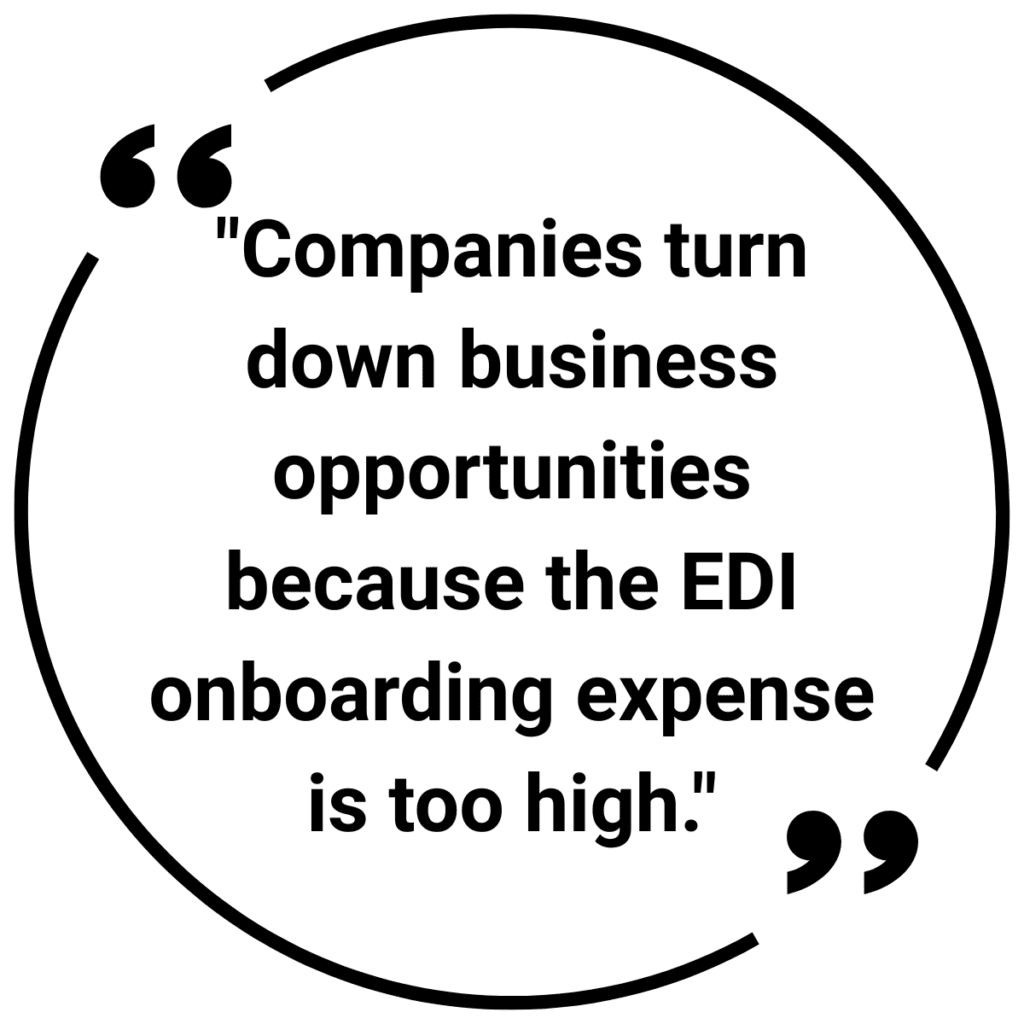Recently, I have heard from many leading companies across various industries that are seeking modern EDI solutions to enhance their existing, challenging-to-maintain solutions. From retail giants processing millions of POs to manufacturers coordinating complex supply chains, businesses are discovering that EDI doesn’t have to be a bottleneck in business processes. Modern EDI solutions are revolutionizing the flow of invoices, purchase orders, advance shipping notices, shipping tenders, and other critical documents through organizations, powered by approaches that put control back in the hands of IT teams.
Although automation continues to advance with cutting-edge technologies, EDI remains the foundation of B2B commerce. Yet, many organizations still struggle with outdated, inflexible, or expensive EDI solutions that make it difficult to onboard new business partners or respond to rapidly changing requirements.
The good news? Companies are finding innovative ways to overcome these obstacles. Let’s explore seven common EDI pain points that modern solutions like Eradani Connect are helping businesses eliminate.
1. Lack of Control Over EDI Processes
Traditional EDI platforms often trap organizations in rigid systems where making simple changes requires time-consuming vendor intervention. This inflexibility slows down business and can cost revenue opportunities. A retail chain can’t quickly onboard new suppliers during peak season. A manufacturer turns down orders because it can’t rapidly support the customer’s unique EDI structure. Healthcare providers wait weeks to comply with new regulatory standards.
Modern EDI solutions are changing this dynamic. With self-service tools and AI-assisted mapping, companies across sectors are taking back control. Eradani Connect, for instance, lets you modify existing documents, create new ones, or onboard new partners without vendor dependencies. A major electronics distributor recently used these capabilities to onboard five new suppliers in a single afternoon – something that previously took months.
2. Unpredictable Costs
Per-transaction fees create budgeting nightmares across industries. A growing e-commerce company watches costs skyrocket during holiday sales. A healthcare network sees expenses balloon as patient volume increases. Manufacturing companies hesitate to pursue new partnerships, worried about the financial impact of additional EDI volume.
Forward-thinking organizations are moving to predictable pricing models. Eradani Connect’s flat annual fee structure means your EDI costs stay stable whether you’re processing hundreds or millions of transactions. One rapidly growing retailer reported saving 40% on EDI costs in their first year after switching from transaction-based pricing to fixed pricing. They were able to use the savings to invest in business expansion.
3. Slow Response to Customer Needs
In today’s market, waiting weeks for EDI changes is unacceptable. Yet that’s exactly what many companies face. A food distributor loses a major grocery chain contract because it couldn’t meet EDI requirements fast enough. A medical device manufacturer misses a hospital system RFP deadline due to EDI delays. An automotive parts supplier watches competitors win business while they wait for document modifications.
Modern solutions slash these timelines from weeks to hours. With Eradani Connect, companies make changes themselves, immediately. A national wholesale distributor recently modified their entire EDI document set to meet a major retailer’s requirements in just four hours, winning a multi-million dollar contract in the process.
4. Lack of Deployment Flexibility
The one-size-fits-all cloud approach doesn’t work for everyone. Financial services firms need on-premises solutions for regulatory compliance. Healthcare organizations require HIPAA-compliant private cloud options. Manufacturing companies want to keep sensitive supply chain data behind their firewalls.
Today’s best EDI solutions offer true flexibility. Whether you need on-premises deployment for security, private cloud for scalability, or hybrid approaches for complex requirements, modern platforms adapt to your needs, not the other way around. Eradani Connect supports all deployment models, letting each organization choose what works best for their unique situation.

5. Complex Partner Setup
Every industry shares this frustration: onboarding new trading partners shouldn’t require an IT project. Yet retailers wait months to add new suppliers. Manufacturers delay production because they can’t quickly connect with new vendors. Healthcare providers postpone service launches while EDI connections crawl through setup. Companies turn down business opportunities because the EDI onboarding expense is too high.
Self-service capabilities are revolutionizing partner onboarding. A major consumer goods company recently onboarded 15 new retail partners in a single week using Eradani Connect’s self-service tools—a process that previously took their team six months. This speed translates directly to competitive advantage and revenue growth.
6. EDI Systems Operating in Silos
Modern businesses need integrated technology stacks, yet many EDI systems remain isolated islands. This creates massive inefficiencies. Retail companies manage separate systems for EDI orders and API-based inventory updates. Manufacturers juggle disconnected EDI and IoT data streams. Healthcare organizations struggle to connect EDI claims processing with modern patient management systems.
Unified integration platforms solve this challenge. Eradani Connect treats EDI as just another integration type alongside APIs, real-time messaging, and file transfers. Everything operates from a single platform with consistent development, monitoring, and management. A global manufacturer recently consolidated five separate integration tools into Eradani Connect, reducing complexity while improving visibility across all B2B connections.
7. Reliance on Specialized EDI Knowledge
The EDI expertise shortage affects every sector. Retail companies watch their EDI specialists retire, taking decades of knowledge along with them. Healthcare organizations struggle to find staff who understand both EDI and HIPAA requirements. Manufacturing firms compete fiercely for the shrinking pool of EDI professionals.
AI-powered tools and intuitive interfaces are democratizing EDI management. Modern platforms make EDI accessible to broader IT teams, reducing dependence on specialized expertise. User-friendly interfaces, AI-guided mapping, and intelligent automation mean your existing staff can manage EDI effectively. One financial services firm successfully transitioned EDI management to their general IT team after implementing Eradani Connect, eliminating their recruitment challenges entirely.
How Modern EDI Solutions Transform Business Operations
By addressing these seven pain points, companies across industries are discovering that EDI can actually become a competitive advantage. Whether you’re in retail, manufacturing, healthcare, logistics, or any other industry that relies on B2B connections, modern EDI solutions offer the tools to eliminate long-standing frustrations.
The organizations succeeding today aren’t just maintaining their EDI—they’re transforming it. They’ve moved from reactive firefighting to proactive innovation. They’re onboarding partners faster, reducing costs, and responding to market changes in real-time.
In our interconnected business world, your EDI solution shouldn’t hold you back. It should propel you forward. Take control of your EDI today and turn yesterday’s necessary evil into tomorrow’s strategic asset. If you’d like to learn more about how Eradani Connect can help transform your EDI operations, drop us a note here. We’d love to hear from you.
Ready to Transform Your EDI Operations?
If you’re tired of EDI bottlenecks holding your business back, join us for our free 3-part webinar series starting July 31st. Eradani CEO Dan Magid and Chief Architect Aaron Magid will share practical strategies and live demonstrations showing how companies are slashing partner onboarding time by 90%, eliminating transaction fees, and taking back control of their EDI processes. Whether you’re struggling with vendor delays, rising costs, or aging systems, you’ll discover proven solutions you can implement immediately. Register for the first session here or learn more about the complete series.


Dan has spent over thirty years leading companies that help customers implement new technologies in legacy environments. Previously, Dan led worldwide software development groups that built highly successful modernization and DevOps tools and was the CEO of Aldon, the leading provider of DevOps tools to the IBM i marketplace. To learn more about Eradani’s offerings, reach out to us today!





